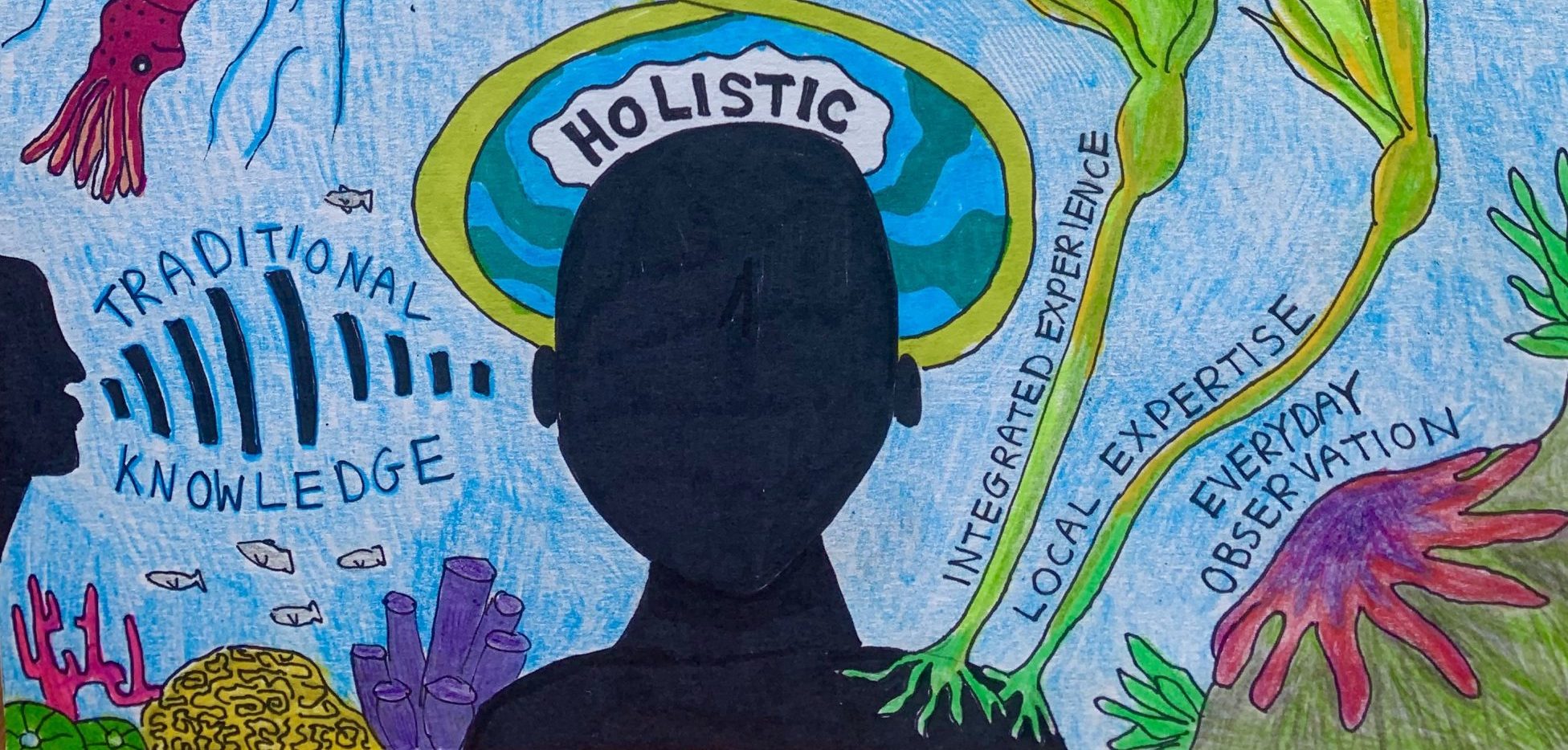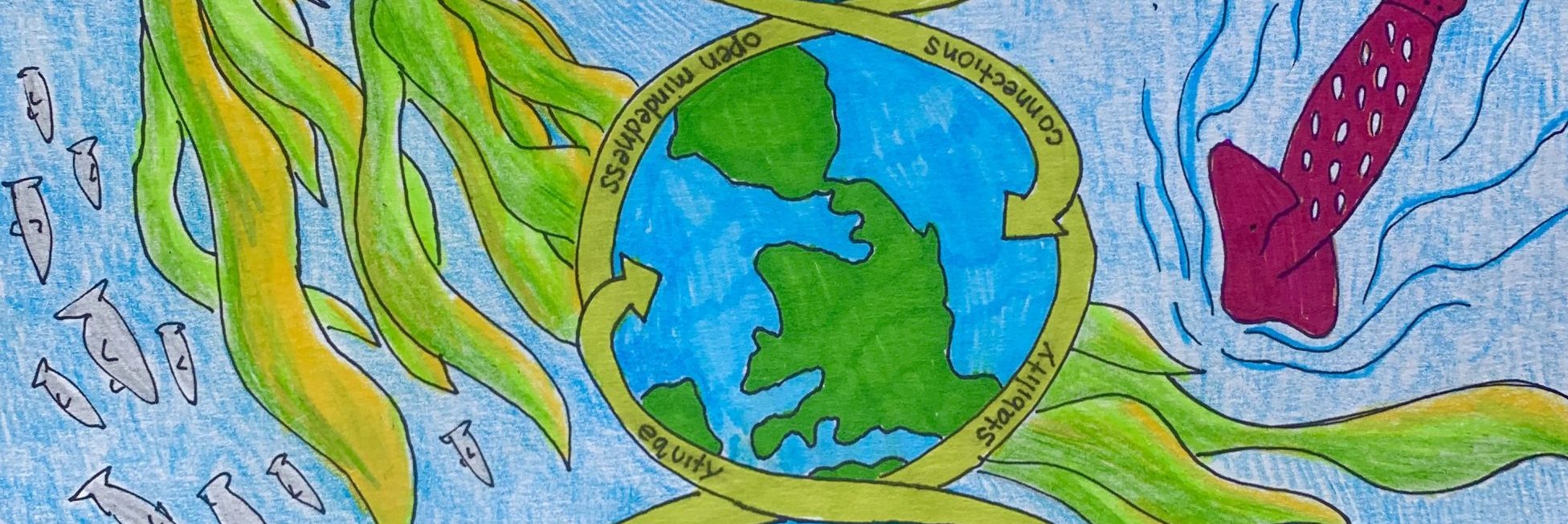
In my ocean conservation and sustainability class we had the upmost privilege to speak with Dr. Andrea Reid an Indigenous fisheries scientist from the University of British Columbia. After an insightful discussion, I immediately went to my drawing board, as I had so much I wanted to reflect on and encapsulate but I didn’t necessarily know how to express it. Drawing has always been one way I can best get across how I feel and think into one tangible piece of work, so I created this drawing and this note. The setting of this piece is an estuary at the end of Burrad Inlet teeming with salmon runs and sunflowers stars which lurk beneath the kelp, a place I consider my home waters in which Andrea had us imagine.


Shadowing on opposite ends of the page, sits the Indigenous and western perspective. Emerging from the western viewpoint, we have the linear, controlled, experiment driven perspective which interlocks around the earth with the Indigenous viewpoint of holistic, integrated experience, local expertise, traditional knowledge, and everyday observation perspective. Together, not one or the other they create the two eye seeing approach, a pathway forward for sustainable fisheries as Dr. Reid touched on in our discussion. At the inter connection of these ways of seeing sprouts 4 key notions for our ocean : stability, equity, connections and open-mindedness.
 These ideas to me create the foundations of how we can form and maintain sustainable relationships with our oceans when Indigenous and western views are put together. The current western dominance of our research and conservation techniques can not solely alone achieve this, it requires the equal inclusion and respect of traditional Indigenous knowledge systems and science as Dr. Reid points out. Coast Salish Indigenous peoples have been protecters of the Salish marine ecosystems since time immemorial, it is time we uphold and give this power back to the original stewards.
These ideas to me create the foundations of how we can form and maintain sustainable relationships with our oceans when Indigenous and western views are put together. The current western dominance of our research and conservation techniques can not solely alone achieve this, it requires the equal inclusion and respect of traditional Indigenous knowledge systems and science as Dr. Reid points out. Coast Salish Indigenous peoples have been protecters of the Salish marine ecosystems since time immemorial, it is time we uphold and give this power back to the original stewards.

I want to specifically speak upon this drawing in relation to the Tsleil-Waututh Nation who live and have protected the estuary as depicted in the drawing for as long as before settlers arrived. Although heavy urbanization and industry has moved into the area threatening the balance of this local ecosystem, the Tsleil-Waututh Nation has been doing amazing work to restore the health of the Inlet, from completing annual fish habitat restoration, restoring clam gardens, conducting salmon population assessments and of all else fighting against the expansion of the trans mountain pipeline and tanker into their home waters and territories. The squid in my drawing represents the Tsleil-Waututh people and the resilience of their nation to push forward and create beautiful waves and currents which will forever shape and protect the life and people who call Burrad Inlet their home.
I also thought of a list of questions I would further want to explore around this topic :
- How do we ensure colonial institutions meaningfully incorporate the two-eyed seeing approach?
- With universities and research facilities often rooted in colonialism (for example : removing Indigenous peoples from their territories to study their lands or discrediting their knowledge for centuries) what reparations need to be made specifically here in British Columbia in order to heal this connection and foster an interlocking Indigenous/western viewpoint in education and research?
- Apart from the two-eye seeing approach what other initiatives should we be partaking in with research to ensure that Indigenous people and their lands are upheld and respected?
Further Resources to Explore
[1] Liboiron, M. (2021). Decolonizing geoscience requires more than equity and inclusion.Nature Geoscience, 14(12), 876-877. https://doi.org/10.1038/s41561-021-00861-7
[2] Reid, A. J., Eckert, L. E., Lane, J., Young, N., Hinch, S. G., Darimont, C. T., Cooke, S. J., Ban, N. C., & Marshall, A. (2021). “Two‐Eyed seeing”: An indigenous framework to transform fisheries research and management. Fish and Fisheries (Oxford, England), 22(2), 243-261. https://doi.org/10.1111/faf.12516
[3] Proulx, M., Ross, L., Macdonald, C., Fitzsimmons, S., & Smit, M. (2021). Indigenous traditional ecological knowledge and ocean observing: A review of successful partnerships. Frontiers in Marine Science, 8https://doi.org/10.3389/fmars.2021.703938